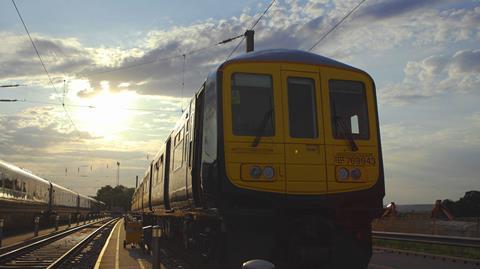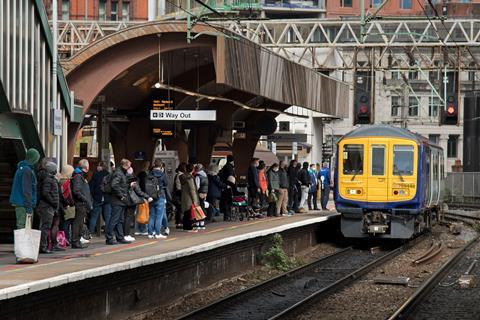
UK: Great Western Railway has confirmed that it is to hand back all 19 of the Class 769/9 multi-system ‘Flex’ multiple-units to leasing company Porterbrook at the end of their current lease agreement in April 2023.
The move forms part of an overall contraction in the operator’s rolling stock fleet, with service cuts expected during 2023. GWR has concluded that there is no likelihood of the trains entering service in the short term.
The decision comes following significant expenditure on the Flex programme by both the Department for Transport and Porterbrook. The promoters had hoped to develop a low-cost fleet by converting redundant Class 319 dual-system EMUs into electro-diesel trainsets. The project was launched as a response to concerns within government about the affordability of a rolling programme of electrification and a perceived reticence from the supply industry to manufacture new DMUs.
The trains for GWR were converted by Wabtec subsidiary Brush Traction in partnership with Porterbrook. This work included the fitting of a pair of 390 KW MAN D2876 engines to the underframe of two trailer cars; these each drove an alternator which fed power into the 750 V DC bus circuit previously used for third rail electric operation.

The GWR sets were the third variant of the Flex concept. Eight Class 769/0 and Class 769/4 sets have been delivered to Transport for Wales, which uses them in diesel mode only. Another eight Class 769/4 sets are working for Northern Trains, where they switch between diesel and overhead 25 kV 50 Hz traction. Both of these fleets have suffered from reliability issues. TfW refused to accept a ninth trainset after deciding it did not meet acceptable standards, while Northern took half of its fleet out of traffic for a period earlier this year. Both the Welsh and Northern fleets continue to record very modest reliability figures.
Forever delayed
The 19 Class 769/9 variants for GWR were intended to operate as trimode units, taking power from the 750 V DC third rail supply as well as 25 kV AC and diesel power. This would enable them to work a range of services around the Thames Valley, including routes between Reading and both Oxford and Gatwick Airport. They were expected to use their third rail capability on sections of the North Downs route to Gatwick.
Their introduction was intended to release 16 Class 165 Turbo DMUs for redeployment to regional services in southwest England. GWR had expected to put the first Flex sets into traffic in 2019, but none were delivered until August 2020 and a range of issues thrown up during testing saw their planned entry into service put back repeatedly. Six trains have been formally accepted by the operator, but the remaining 13 are stored at Porterbrook’s Long Marston test track.
The decision to cancel the lease is understood to have been made by DfT, which is expecting budget cuts from all TOCs as part of their 2023-24 business plans. According to GWR insiders, abandonment of the Class 769 project will create a capacity challenge, but there were several factors favouring the handing back of the trains. These included the fact that no GWR drivers were yet trained to operate them, the age of the ex-Class 319 donor vehicles and the poor reliability experienced during testing.
Smaller fleet as cuts loom
The decision to not to introduce the Flex sets has implications for GWR’s overall fleet and network capacity, especially on services in Devon and Cornwall, where the displaced Class 165/166 DMUs were due to be redeployed.
These problems are being exacerbated by the phased withdrawal of the shortened IC125 trainsets, branded ‘Castles’. GWR is expected to withdraw 16 of these sets by December 2023. ‘With the loss of the Castle sets as well as the expected 165/166 sets we are really squeezing things quite a lot’, the GWR insider confirmed. ‘Which does concern us, but we will have to work to make the best with what we have.’
As an interim measure, some additional capacity for Devon and Cornwall services could be provided by redeploying five-car Class 802 inter-city trainsets withdrawn from the London – Bristol route. GWR is also reportedly looking to lease some more Class 158 DMUs, but it is unclear whether or when these could be sourced. ‘You don’t have to be a rocket scientist to know that running 200 km/h Class 802s worth £2m per vehicle up and down Cornwall at 100 km/h on diesel is not the best use of those trains’, one manager commented.
The operator is anticipating that some of its fleet limitations may be eased from the May 2023 timetable change. This is expected to see the number of services across the national network reduced as part of the DfT-mandated cost-cutting drive.



